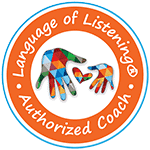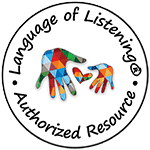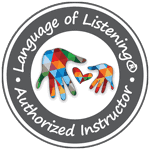Inside: Learn one phrase that will help your child get unstuck when a challenge shows up. If your child says, “I can’t” or wants to quit, this is the best response.
I took two sips of coffee, sat on the couch and immediately noticed my strong-willed child creeping down the stairs. The scowl on his face said it all. I’d been parenting for less than 2 minutes this morning and I could already feel the cloud of frustration between us.
Everything was blurry.
I wanted to start the day positive, so I stood up and turned to the stairs trying to look as empathetic as possible. “Looks like you’re upset. Do you want to play a bit before starting school?”
He was more despondent than ever. “No, I hate school. I’m not doing it!”
This is hard.
I started thinking about how much my child used to love school, and also how frustrating and challenging it is for him some days.
Sitting for longer than he wants.
Following the new rules.
Learning new skills.
All of it can lead to this cloud of frustration that permeates around him.

Related: Raising a Strong-Willed Child: 10 Phrases That Will Improve Cooperation and Listening
Then he saw it. The paper.
“Can I draw on this, mom?” His eyes turned happy and the corners of his mouth widened revealing every single one of his teeth. I immediately smiled back.
“Yep. That’s for you, buddy.”
He immediately flipped opened the first blank sheet and began writing random letters, pictures and shapes across the paper.
For a second I breathed a sigh of relief thinking we were past the scowls and cloud of frustration.
Then I heard it.
The complaining words I cringe hearing every time he says them to me.
“I can’t do it! I give up.”
I knew the best response…
It also happens to be my all-time favorite (and simplest) way to build problem solving skills in kids.
Related: How to Help a Child Focus in the Classroom – 5 Things Parents Can Do
What to say when your kid gives up.
Before I could respond with my golden phrase, he repeated his negative self-talk to me again. This time with more gusto and persistence in his voice. “I can’t do it! I give up!”
There’s a part of me that wanted to respond with something that would fix the problem for him.
Things like…
“You can do it!”
“It looks totally fine!”
“Just try again.”
Those phrases make me feel better and like I’m doing something, but I don’t find that my son tries any harder.
Instead, I’ve found that he really tries again and works harder when I set the stage for him to solve the problem all on his own (using my golden phrase).
Related: The Best Printable Daily Schedule for Kids to Build Cooperation and Listening

I sat down next to him at heart level and gently, slowly, deliberately I said my one phrase into his ear.
“Show me the hard part.”
He pointed to the part of the picture where he was writing his name and announced, “HERE!”
Smack dab in the middle of writing his name, he couldn’t seem to get the “S” perfect.
Once I knew where the hard part was for him, I immediately started describing the situation using SAY WHAT YOU SEE® (SWYS) – a technique from Language of Listening®, the 3-part parenting framework that I use.
“You were writing your name down on this paper. You finished the A, M, E and then when you got to the next letter you were stuck. It looks like you wanted the “S” to be just right. I see you erased it and wrote it again.”
He nodded affirming what I said. “Yes, I can’t do it. I can’t do the “S”.
I continued with SWYS. “You wrote first part of the “S” and then it looks like you aren’t sure what to do next. There must be some way you can learn to write the letter “S” as well as you want to.”
He said matter-of-factly, “I need to write more of the letter “S”.

Why this works.
When I see kids say “I can’t” or want to give up or fall straight into whining, I love saying “Show me the hard part” because it gives you – the parent or teacher – a lot of useful information.
It helps you know right away what part is easy and what part is especially hard for the child. It also helps the child recognize what area is creating their biggest challenge and it breaks it down into a smaller challenge.
I could’ve easily seen all letter writing as a challenge for my son. But it turned out the only thing that was bothering him was how to write an “S”.
By describing the situation using SAY WHAT YOU SEE, it immediately becomes more manageable for you and the child.
This simple technique puts you in the neutral zone with kids where you can all agree on what is happening in the here and now.
Kids are less likely to get defensive or try to prove to you that they “really can’t do it.” (This is often what happens when we say ‘You can do it’ or ‘Just try again.’ Kids will dig in their heels to prove they really, really can’t do it.)
Here’s the best part.
“Show me the hard part” allows the child to solve the problem. This is the best learning of all.
Yesterday, my son was working on another project at the kitchen table. This time it was drawing faces with tails inside of trees (don’t ask, lol).

He said, “I can’t do it, mom. I can’t draw these trees.”
And before I could get to heart level and say “Show me the hard part,” he stopped me and said, “But that’s okay. I can just draw more trees. I’ll just try again.”
This time, the cloud of frustration that made everything blurry was notably absent.
And those dark and scary woods?
He found a way to move forward anyway.
Want more on parenting?
- 2 Year Old Not Listening? Try This Remarkable Tip
- How to Handle Back Talk and Disrespect Like a Parenting Warrior
- What’s Really Behind Angry and Aggressive Behaviors in Kids
- The Most Overlooked Reason Why Kids Won’t Listen, Focus or Sit Still
I've created a free email series just for you! If you are struggling with teaching your child to listen, this series will help transform your parenting. Yes, really. I've seen my proven strategies work time and time again for parents. I know it can work for you too.
After taking my free email series, you will:
- Learn simple, yet highly effective listening strategies
- Experience a stronger connection with your child
- Enjoy more peaceful parenting days
- Gain more cooperation from your child














Refreshing, factual and appreciated, thank you.
You’re so welcome!
You are a life saver, thank you for sharing your kindness, love, and wealth of knowledge. Your simple tips and tricks have made being a single mom of two toddlers a wonderful journey and have eased many of my stress points. Thank you from the bottom of my heart!
Thank you! I’ll try it out on my son soon.
My son is constantly saying “I can’t do it” and it has been so frustrating. Thank you! I’m definitely going to give this a try to see how he responds.
Very useful article for moms. Many times my daughter refused to do her he or many other things which I want her to do. But she’s simply says I can’t do this mom. Next time when she says this I will try your techniques. Thanks for sharing. https://mommystimeline.com
Within an hour of reading a previous post I had an opportunity to use the “You want..”. Immediately he tears ceased and I was able to have the 8 yr old boy HEAR me.
Thanks
OH how awesome!!! I love hearing that.
I love the simple way to help them out of their frustrations. My son and daughter say the words I can’t a lot! ?
Love this post! It’s a great reminder that helping kids who say “I can’t!” can be overwhelming for us, too, if we assume that they mean they can’t do the whole thing. Your writing is very moving–I really felt the frustration and then the empowerment, and got emotional reading about it. Thank you for sharing!
Hi I love this post. Sometimes, as parents we get so bogged down with all that we have to do that we are unable to relate to our kid’s simple problems. I like how you illustrated how to use the phrase and why it worked. It really shows a parent what to do if they have a similar problem. Great advice to put into practice.